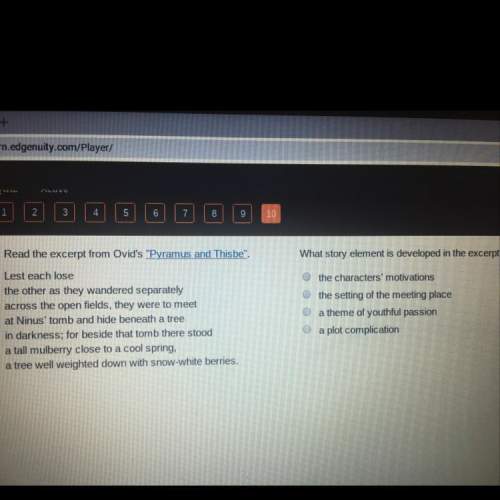
English, 24.02.2021 17:40 juanitarodrigue
Which two sentences in this excerpt from Sir Walter Scott's Ivanhoe indicate that the novel is a work of historical fiction?
"Thy life, minion?" answered the sibyl; "what would taking thy life pleasure them?—Trust me, thy life is in no peril. Such usage shalt thou have as was once thought good enough for a noble Saxon maiden. And shall a Jewess, like thee, repine because she hath no better? My father and his seven sons defended their inheritance from story to story, from chamber to chamber—There was not a room, not a step of the stair, that was not slippery with their blood. They died—they died every man; and ere their bodies were cold, and ere their blood was dried, I had become the prey and the scorn of the conqueror!" . . .
As another instance of these bitter fruits of conquest, and perhaps the strongest that can be quoted, we may mention, that the Princess Matilda, though a daughter of the King of Scotland, and afterwards both Queen of England, niece to Edgar Atheling, and mother to the Empress of Germany, the daughter, the wife, and the mother of monarchs, was obliged, during her early residence for education in England, to assume the veil of a nun, as the only means of escaping the licentious pursuit of the Norman nobles. This excuse she stated before a great council of the clergy of England, as the sole reason for her having taken the religious habit. The assembled clergy admitted the validity of the plea, and the notoriety of the circumstances upon which it was founded; giving thus an indubitable and most remarkable testimony to the existence of that disgraceful license by which that age was stained. It was a matter of public knowledge, they said, that after the conquest of King William, his Norman followers, elated by so great a victory, acknowledged no law but their own wicked pleasure, and not only despoiled the conquered Saxons of their lands and their goods, but invaded the honour of their wives and of their daughters with the most unbridled license; and hence it was then common for matrons and maidens of noble families to assume the veil, and take shelter in convents, not as called thither by the vocation of God, but solely to preserve their honour from the unbridled wickedness of man . . .
"Thy language," answered Rowena, "hath in its indifferent bluntness something which cannot be reconciled with the horrors it seems to express. I believe not that thy purpose is so wicked, or thy power so great.". . .
At one end of this ghastly apartment was a large fire-grate, over the top of which were stretched some transverse iron bars, half devoured with rust.

Answers: 2


Another question on English

English, 21.06.2019 16:40
Read the excerpt and answer the question. then i lost my head entirely, mad with the power of exciting such what type of figurative language is used in the excerpt? idiom hyperbole metaphor alliteration
Answers: 1

English, 22.06.2019 00:30
In hard times by charles dickens, the scene in which the characters discuss the depiction of horses on wallpaper and flowers on carpets is the author’s way of showing the absurdity of
Answers: 1

English, 22.06.2019 02:30
Awell-worded thesis statement is both and generally acceptable . . broad agreeable . . limited significant . . limited significant . . broa
Answers: 1

English, 22.06.2019 04:30
Armed with invisible ink, a cipher system, and a passion to end the war and preserve the union, elizabeth van lew became butler's eyes and ears in the confederate capital city. truth be told, however, she became much more than that. she became a spymaster, the person responsible for running a network of agents, couriers, and safe houses that was very active during the war. in addition to the spying, elizabeth van lew continued to maintain her church hill home as a safe house and something of a local union spy headquarters. —the dark game, paul janeczko what is the central idea of this passage? van lew’s home was used as a safe house, which was critical to the confederacy. van lew had a passion to end the war and preserve the union. van lew was a spymaster, a leading force in the espionage activities for the union. van lew did not enjoy working for general butler.
Answers: 1
You know the right answer?
Which two sentences in this excerpt from Sir Walter Scott's Ivanhoe indicate that the novel is a wor...
Questions




















Computers and Technology, 09.12.2019 21:31




